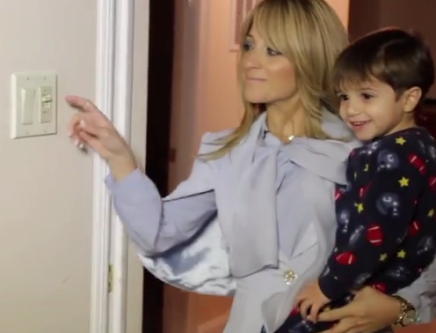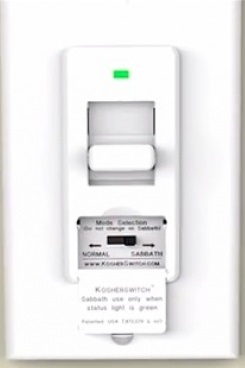
Banner

Is this switch Shabbat compliant?
ANT KATZ
Is it or isn’t it?
In a surprise development today, however, Jewish Report Online discovered that the SA Beth Din has spent years developing a “gramma,” device of their own and the Beth Din are about to start marketing it.
 Rabbi Dovid Baddiel, a Dayan at the Joburg Beth Din, told Jewish Report that they had been working on just such a device for years and it had recently received full approval by the Tzomet Institute in Israel. We launched our own gramma device to rabbonim at a lunch just before Pesach,” said Baddiel today.
Rabbi Dovid Baddiel, a Dayan at the Joburg Beth Din, told Jewish Report that they had been working on just such a device for years and it had recently received full approval by the Tzomet Institute in Israel. We launched our own gramma device to rabbonim at a lunch just before Pesach,” said Baddiel today.
They are hoping to be in a position to start marketing it before Shavuot, said Dayan Baddiel. He did make the point, however, that the ‘Gramma loophole’ is not for switching on lights, but more for “essential safety and security purposes.”
Jewish Report will be liaising with Rabbi Anton Klein of the Beth Din and bring our readers and users further information on the new device.
The information above turns ‘The Story That Was’ completely on its head. SAJR was hoping that the Beth Din would tell the community their position vis-a-vis the device that has been the centre of discussion among the Jewish world over the past week.
The story that was….
In what promises to be a revolutionary innovation that could transform Jewish observance of Shabbat and Chagim, US boffins believe they have developed a Halachic-compliant light switch.
At issue is whether the device’s permissibility for Shabbat relies on a Jewish legal loophole that applies only to extraordinary circumstances like medical or security needs. The loophole, known as a “gramma,” allows for indirect activation of electronic devices on Shabbat.
SHALOMLIFE.com points out, however, that some critics say the Kosher Switch isn’t really kosher for Shabbat at all – and that Kalati is misrepresenting rabbinic opinions on the matter to give the false impression that he has their endorsements.
The Jewish Telegraphic Agency, JTA, reports that the inventor of the Kosher Switch, Menashe Kalati, considers it to be a, “long overdue, techno-halachic breakthrough,” When the switch is turned off, a piece of plastic prevents an electric light pulse from being received that would allow the light to be turned on. When this plastic switch, which isn’t connected to anything electrical, is turned into ‘on’ position, it frees up the pulse to work as normal. According to Kalati, it’s kosher for use during Shabbat.
The issue is top of mind in this week’s Jewish media worldwide as controversy among Rabbinic sources argue on the matter.

LEFT: Kalati’s Kosher light switch close-up
The device’s detractors say it relies on the “gramma” loophole whereby if, for example, a non-life-threatening field fire is burning on Shabbat, jugs full of water may be placed around the fire to indirectly cause its eventual extinguishing. Dowsing the fire directly — a Sabbath prohibition — is permitted only in life-threatening circumstances.
Kalati says his switch is Shabbos compliant, but not all rabbonim agree
But the developer, Kalati, 43, says his switch does not rely on the gramma loophole. When the switch is in the off position, a piece of plastic blocks an electronic light pulse that when received turns on the light.
This, Kalati, and the rabbis supporting his argument, say means that turning the switch on moves the piece of plastic, which is not connected to anything electrical, so that it no longer obstructs the pulse.
Last week Kalati posted a video on crowd-financing website Indiegogo and raised $45,000 of the $50,000 dollars they needed to start production in just three days! In his video, Kalati says his team has spent years on research and development, during which time “we’ve been privileged to meet with Torah giants who have analysed, endorsed and blessed our technology and endeavours,” he says.
But Yisrael Rosen, head of the Tzomet Institute, the leading designer of electronic devices for use on Shabbat (and the same Institute that has approved the South African design), says the Kosher Switch is unfit. “Today, Israeli media reported the invention of an electric ‘Kosher switch’ for Shabbat, with the approval of various rabbis. This item was recycled from 2010 and already then denials and renunciation by great rabbinic authorities were published regarding everyday use for this product,” Rosen wrote Tuesday on Tzomet’s website. “No Orthodox rabbi, Ashkenazi or Sephardi, has permitted this ‘Gramma’ method for pure convenience.”
The son of a rabbi whose endorsement appears in the video, Rabbi Noach Oelbaum (who says it does not violate the prohibition on Sabbath-day labour), told JTA that his father’s position was distorted and advises kosher users to consult their own rabbis on the question of whether or not they may use it on Shabbat.
Hardly the first tech innovation
This is hardly the first technological innovation devised to ease Shabbat observance. For decades Jews have used electronic timers set before Friday night to control lights and appliances like air conditioners or hot plates. Multi-story buildings throughout Israel and some in the US have Shabbat elevators that can run on autopilot. In 2004, Canadian rabbi and entrepreneur Shmuel Veffer invented a bedside-style lamp called Kosher Lamp that could be “turned off” by twisting a cylinder encasing a lit bulb so that the bulb was completely concealed.
SEE HILARIOUS “SHABBOS GOY” VIDEO ON THIS SITE
The Zomet Institute, located in the Jerusalem suburb of Gush Etzion, in the West Bank, has invented baby sensors, sump pump gadgets, hot water heater contraptions, and special switches that modify wheelchairs, hospital beds, electronic scooters and staircase elevators for use on Shabbat. However, many of these devices rely on the gramma loophole and are permitted only for medical or security use.
Going back to the Jewish Report’s original question to Rav Baddiel on whether the SA Beth Din would approve the controversial Kalati kosher switch, Baddiel says that “the South African Beth Din don’t know too much about the technology behind it yet,” and have therefore not had time to assess and analyse the product yet. “We are unable to render an opinion at the moment,” says Rabbi Baddiel.
But, given what he told Jewish Report, it is clear that our Beth Din will ion principle consider any device they consider to be halachically compliant.
Who is Rabbi Dovid Baddiel?
 Born in the UK to a distinguished rabbinic family, Rabbi Baddiel has studied in some of the most well-known yeshivot in Europe and Israel.
Born in the UK to a distinguished rabbinic family, Rabbi Baddiel has studied in some of the most well-known yeshivot in Europe and Israel.
After spending six years in Gateshead Talmudical College, he moved to the Mirrer Yeshiva in Jerusalem where he learned for a further six years, followed by learning at the Harry Fischel Institute for Rabbinics and Dayanut in Jerusalem, where he received his qualifications in Dayanut.
Rabbi Baddiel moved to South Africa in October 2009 with his wife and five children and joined the Beth Din as a Dayan from November 2009.





David
April 22, 2015 at 11:58 pm
‘What a pity that our Rabbonim around the world have put so much importance on a Halachic switch rather than important issues that involve the entire Jewish community.
Could they not spend their time more usefully on ‘abuse of spouses and children ‘ education, support for the elderly Jews living on their own, and support of Jews who financially battle to make ends meet.
A travesty that the energy of our religious leaders cannot be spent on more useful things to the community as a whole. ‘
Choni
April 23, 2015 at 8:50 am
‘Following up on David’s comment, I know of quite a few Rabbis who place much importance on a mitzvah like this one, yet regard the mitzvah of Yishuv Eretz Yisrael as non- binding.’
JOAN
April 23, 2015 at 10:19 am
‘ABSOLUTELY PATHETIC.
BRAINS LIKE OUR CABINET’
Denis Solomons
April 24, 2015 at 9:19 am
‘I find it hard to understand how the shabbos-lifts that stop at every floor on shabbos are Shabbos compliant !
Are these elevators compliant ?’
Ovadia
April 26, 2015 at 6:44 am
‘Wow. the Beth Din have spent YEARS developing a Sabbath switch? Now we know where our chicken and meat money goes.’
Bernard Baruch E
April 28, 2015 at 4:39 am
‘Of course they won’t approve the Kalati switch, there’s money to be made on their own product. How else do they expect to pay for all those overseas trips and luxury cars?’